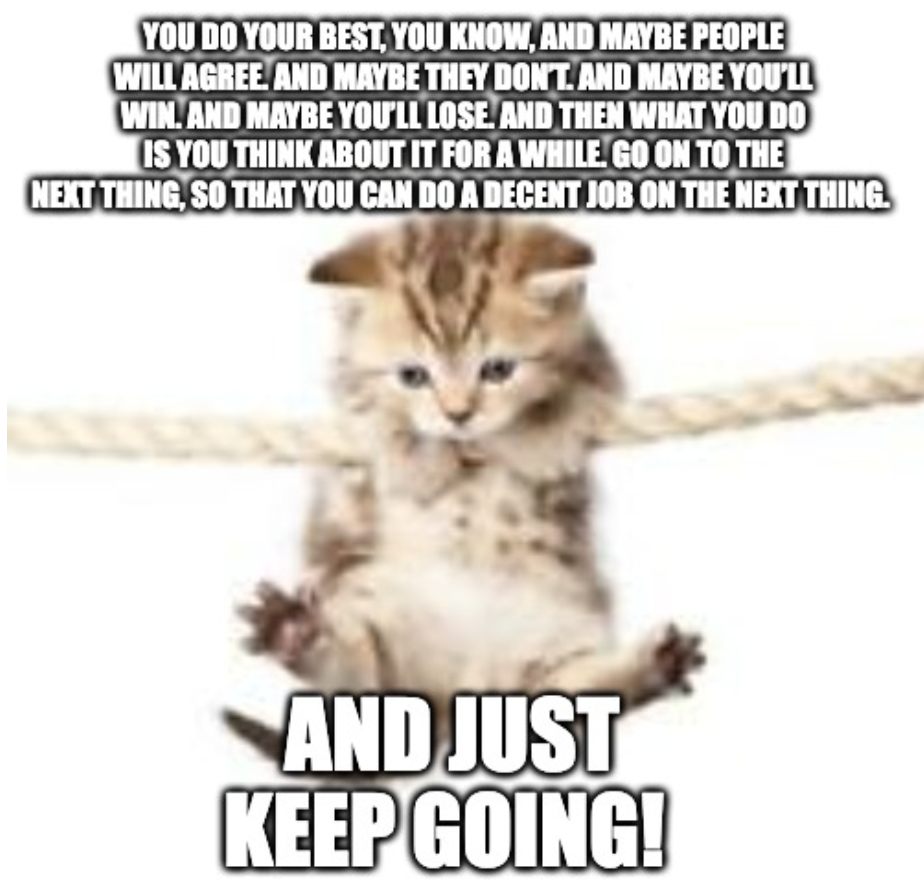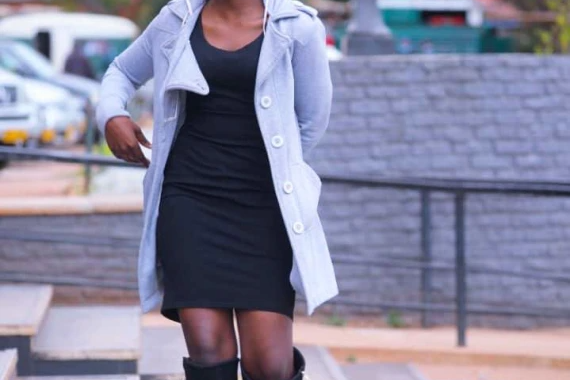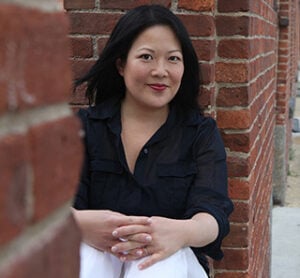Author
Helen
Wan
(courtesy
photo)
“And
blame
postmodern
things
I
can’t
relate
/
Like
summer
camp
in
coastal
states
/
Like
alcohol
and
coffee
beans
/
Dance
floors
and
magazines
/
I
think
it’s
safe
to
say
I’ve
only
got
myself
to
blame.”
—
The
Format
This
week,
I
had
the
opportunity
to
catch
up
with
Helen
Wan
—
an
author,
lawyer,
and
speaker
on
DEI
and
women
in
the
workplace.
Wan
is
a
graduate
of
Amherst
College
and
The
University
of
Virginia
School
of
Law.
Wan’s
novel,
“The
Partner
Track,”
follows
idealistic
young
lawyer
Ingrid
(played
in
the
series
by
Arden
Cho)
as
she
competes
to
climb
the
partner
track
at
a
New
York
law
firm,
premiered
as
an
original
Netflix
series
last
month.
I’ve
covered
the
lack
of
diversity
in
the
media
time
and
time
again
(see
here,
here,
and
here),
so
I
won’t
digress
on
how
critical
representation
is
to
our
industry
specifically
and
society
as
a
whole.
Wan’s
story
from
the
launch
of
her
book
to
the
landing
of
an
original
Netflix
series
is
a
testament
to
her
hard
work,
grit,
and
the
realization
of
dreaming
big.
It
was
incredible
to
learn
about
the
rocket
ship
and
roller
coaster
(rocket-coaster)
trajectory
of
“The
Partnership
Track”
as
well
as
the
trials
and
tribulations
she’s
faced
throughout
her
career.
After
speaking
with
Wan,
I
couldn’t
help
but
want
to
write
my
own
story.
And
I
believe
you
will
too
after
hearing
more
about
her
journey
of
bringing
her
novel
to
our
television
screens.
Without
further
ado,
here
is
a
(lightly
edited
and
condensed)
write-up
of
our
conversation:
Renwei
Chung:
You
started
writing
“The
Partner
Track”
23
years
ago,
it
was
published
in
September
2013,
and
premiered
on
Netflix
as
an
original
TV
series
last
month.
Can
you
believe
it?
Helen
Wan:
This
has
been
a
thrilling
roller
coaster
ride.
To
be
honest,
I
still
wake
up
some
mornings
not
quite
believing
any
of
it.
It’s
very
much
a
Cinderella-at-the-ball
feeling.
RC:
Can
you
discuss
the
process
of
bringing
the
book
to
life
on
our
living
room
screens?
HW:
Sure,
how
much
time
ya
got?
Ha.
It
only
took
me
23
years
from
the
day
I
originally
took
pen
to
paper,
on
my
subway
commute
to
and
from
work,
to
seeing
these
Parsons
Valentine
lawyers
live
and
breathe
on
my
TV.
There
were
so
many
stops
and
starts
along
the
way.
Even
when
an
author
is
lucky
enough
to
have
a
work
published,
let
alone
optioned,
all
the
stars
must
align
to
end
up
with
a
TV
series!
And
they
didn’t,
at
least
not
for
a
long
time.
By
the
morning
I
received
the
astounding
news
from
my
agent:
“Hi!
Are
you
sitting
down?
I
believe
Netflix
wants
to
make
a
show
out
of
your
book!”
I
had
honestly
almost
written
off
the
possibility.
I’d
never
truly
imagined
all
of
the
stars
aligning
the
way
they
did,
for
this
to
happen.
So
when
I
finally
curled
up
and
binge-watched
all
10
episodes
of
the
show
one
recent
weekend,
it
was
magical.
It
was
the
kind
of
smart,
sexy,
savvy
show
that,
if
I’d
just
randomly
stumbled
upon
it
one
night
while
looking
for
something
new
to
watch,
I
would
honestly
have
loved
it
then,
too.
And
that
was
a
happy
thing
to
find
out.
RC:
What
was
your
inspiration
for
the
epigraph
by
Ruth
Bader
Ginsburg:
“I
would
not
like
to
be
the
only
woman
on
the
Court.”
HW:
Oh,
I’ve
always
loved
that
quote
from
the
Notorious
RBG.
Her
life
and
legal
career
already
made
her
a
role
model.
But
that
epigraph
is
meaningful
to
me
for
another
reason.
I
dedicated
“The
Partner
Track”
in
memory
of
my
grandmother,
An
Ching
Chun,
who
was
14
years
older
than
RBG.
Both
of
them
were
amazing,
incredibly
intelligent,
resilient
women
who
inspired
me.
Through
circumstance,
one
of
them
fled
the
Chinese
Communist
Revolution
as
a
very
young
mother
and
ultimately
landed
as
a
stranger
in
Mei
Guo
(literally
translated:
the
“Beautiful
Country”)
and
the
other
ultimately
became
a
Supreme
Court
Justice
of
the
United
States.
I
like
to
write
a
lot
about
timing
and
circumstance,
and
how
they
impact
life
outcomes.
RC:
It
is
still
so
rare
to
see
an
AAPI
woman
protagonist
on
television
or
at
the
movies.
How
can
we
ensure
more
of
these
stories
are
told
in
Hollywood
and
the
media
in
general?
HW:
That
one’s
easy.
One
must
walk
the
walk
AND
talk
the
talk.
Meaning,
if
you
really
love
something,
and
you
believe
it’s
a
story
worth
telling,
and
you
wish
there
were
more
stories
like
it
out
there,
getting
in
front
of
eyeballs,
then
you
gotta
put
your
money
where
your
mouth
is.
Watch
the
show.
Buy
the
book.
Go
see
the
play
or
movie.
And
tell
all
your
friends
and
neighbors!
I
know
it’s
not
popular
to
say
this,
but
the
truth
is,
making
art
IS
also
a
business.
RC:
You
mentioned
the
1988
film
“Working
Girl”
as
a
strong
influence
on
some
of
the
themes
in
“The
Partner
Track.”
Can
you
elaborate?
HW:
Oh,
I
could
go
on
all
day
about
that
brilliant
movie!
Talk
about
a
dream
team
of
director
Mike
Nichols
(who
also
directed
another
of
my
favorite
films,
‘The
Graduate”),
Melanie
Griffith,
Sigourney
Weaver,
Harrison
Ford,
Joan
Cusack,
and
the
list
goes
on.
Actually,
I
just
rewatched
it
recently.
Almost
35
years
later,
it
still
strikes
such
a
cultural
chord.
I
think
everyone
loves
a
great
Cinderella
story,
especially
when
our
hero
is
so
believably
flawed
and
vulnerable,
and
underestimated.
I
mean,
who
wants
to
read
(or
write!)
about
a
perfect
person,
who
never
makes
mistakes?
Boring!
That
end
scene,
when
Tess
meets
her
new
assistant,
goes
into
her
new
office,
takes
a
giddy
first
spin
in
her
swivel
chair,
and
that
gorgeous
Carly
Simon
song
swells
and
the
camera
breezes
out
to
a
view
of
the
whole
city,
still
gets
me.
Every
single
time.
That
movie
is
also
a
cinematic
valentine
to
New
York
City,
which
I
love.
RC:
You
read
a
snippet
of
the
summer
outing
scene
during
your
interview
with
Sunni
Yuen,
a
member
of
Google’s
Legal
Department
back
in
January
2014.
It
is
featured
in
Episode
5
“Out
of
Office”
—
how
did
it
feel
to
witness
this
scene
on
the
television
screen?
HW:
The
firm
retreat
was
my
favorite
chapter
to
write,
and
now
it’s
my
favorite
episode
of
the
show
(Episode
5:
“Out
of
Office”).
I
watched
it
and,
literally,
I
laughed,
I
cried,
it
was
better
than
“Cats.”
I
picked
up
the
remote
and
rewatched
it
immediately.
Then
I
called
Georgia
(Lee)
to
tell
her
how
much
I
loved
it.
I
still
find
myself
humming
that
beautiful
Lake
Scene
song
when
Rachel
and
Justin
are
stranded
on
the
water.
It’s
called
“Around
Here,”
by
a
really
talented
singer-songwriter
named
Matt
Holubowski,
and
I
think
his
music
adds
perfect
context
to
that
setting.
RC:
I
noted
three
references
to
Above
the
Law
in
your
book,
as
well
as
three
references
to
Audrey
Hepburn.
How
well
do
you
think
the
Netflix
series
captures
the
book’s
legal
culture
and
fashion
influences
and
references?
HW:
I
was
impressed
with
the
way
this
show
takes
a
book
about
a
law
firm
and
makes
it
an
entertaining
“TV
SHOW!!!”
Yet
it
still
captures
the
thornier
themes
and
topics
I
tried
to
address
with
my
novel.
I
think
it’s
a
fairly
successful
combination
of
“Hollywood
entertainment”
and
verisimilitude.
It
is,
after
all,
a
TV
series
that
seeks
to
entertain
and
enlighten.
And
who
wants
to
watch
a
“100%
authentic”
show
about,
say,
me
drafting
an
asset
purchase
agreement
at
2
A.M.
at
my
desk,
eating
takeout
in
my
gray
college
sweats?
I
mean,
I
personally
think
that
would
be
a
really,
really
boring
TV
show.
Haha.
RC:
I’ve
heard
many
law
schools
and
professors
leverage
last
month’s
series
premiere
of
“The
Partner
Track,”
based
on
a
book
published
almost
a
decade
ago,
to
teach
current
lessons
to
this
year’s
1Ls
and
other
legal
cohorts.
Why
do
you
think
“The
Partner
Track”
has
struck
such
a
chord
in
the
legal
community?
HW:
Yes,
I’m
hearing
from
a
lot
of
law
profs
and
law
partners
and
just
people
in
general
who
tell
me
my
novel
may
have
been
a
bit
“ahead
of
its
time.”
I
think
what
they
mean
is,
we’re
clearly
at
a
different
cultural
moment
right
now,
a
critical
moment
when
many
more
people
are
willing
to
both
read
and
listen
to
and
talk
about
stories
like
Ingrid’s.
And
Tyler’s.
And
even
Murph’s.
And
I
hope
we’ll
get
a
chance
to
continue
telling
these
stories!
There’s
a
lot
more
story
to
tell.
RC:
Of
course,
I
must
bring
up
the
A.1.
Sauce
scene!
Are
you
getting
as
much
response
to
it
nowadays
as
you
did
when
the
book
was
published?
HW:
Yes,
I
definitely
hear
from
a
lot
of
readers,
and
now
TV
viewers,
for
whom
that
A.1.
Sauce
scene
resonates.
And
I
don’t
just
mean
lawyers
and
law
students.
I
think
everyone
has
their
own
A.1.
Sauce
Moment
at
some
point
in
their
lives,
right?
I
don’t
know
anyone
who
hasn’t
felt
like
the
“Outsider”
in
one
way
or
another.
Not
even,
dare
I
say
it,
Dan
Fallon!
RC:
Any
advice
for
someone
wanting
to
balance
a
legal
career
with
a
creative
side
hustle?
HW:
Never
assume
it’s
impossible.
If
you
truly
believe
in
the
project,
don’t
give
up.
I’m
glad
I
didn’t.
On
behalf
of
everyone
here
at
Above
the
Law,
I
would
like
to
thank
Helen
Wan
for
sharing
her
story
with
our
audience.
We
wish
her
continued
success
in
her
career.
Helen
can
be
contacted
via
her
website:
www.helenwan.com,
Twitter
@helenwan1,
and
representation:
josh@hgliterary.com.
Renwei
Chung is
the
DEI
Columnist
at
Above
the
Law.
You
can
contact
him
by
email
at renwei@footnote4.com.

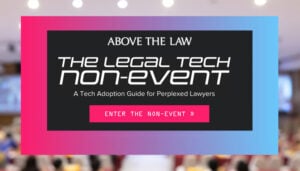


 James
James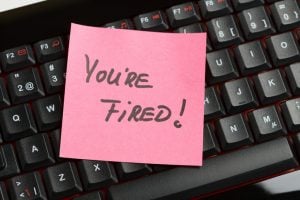



 Kathryn
Kathryn
